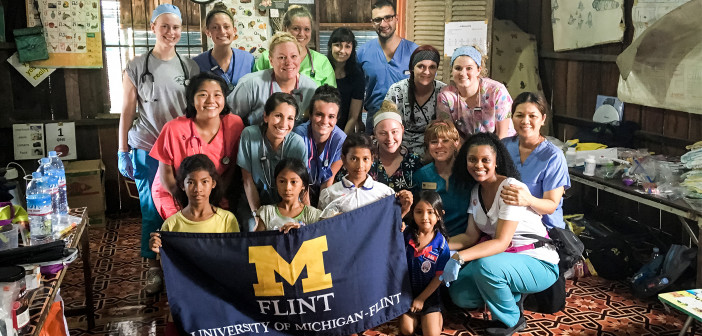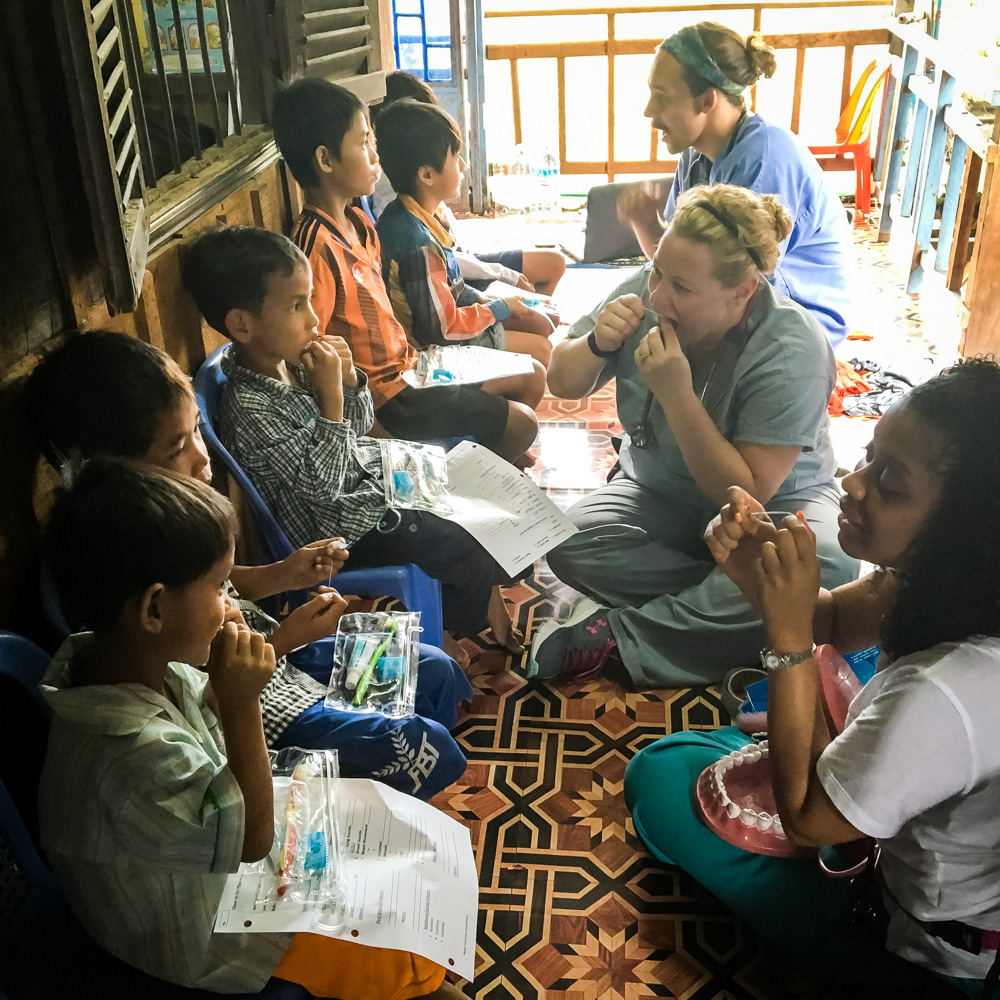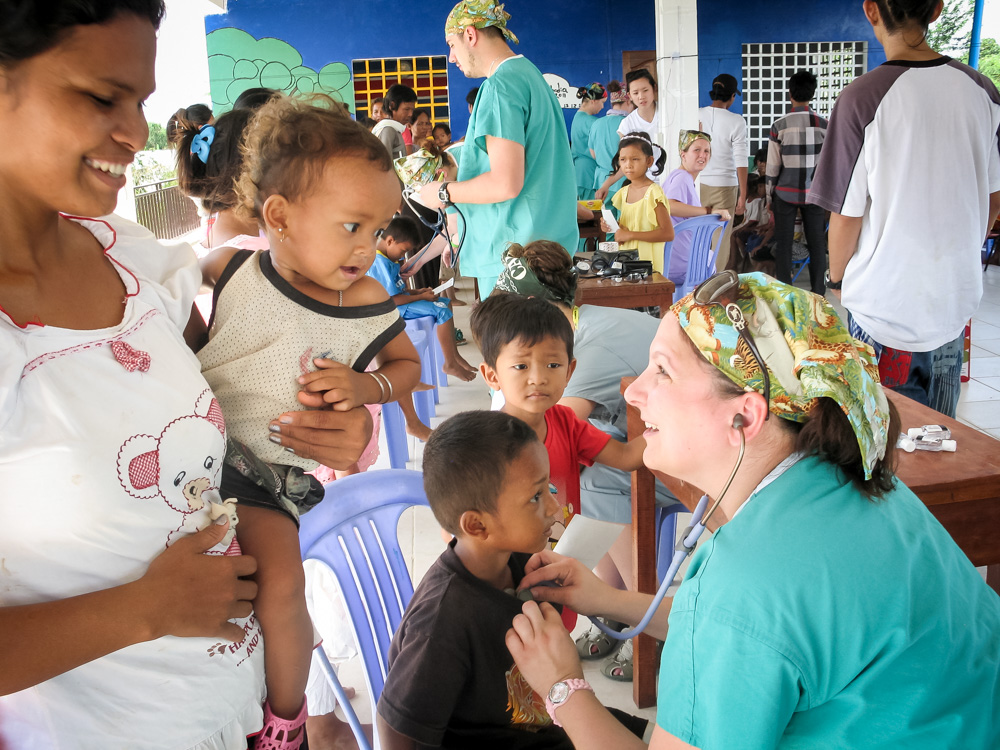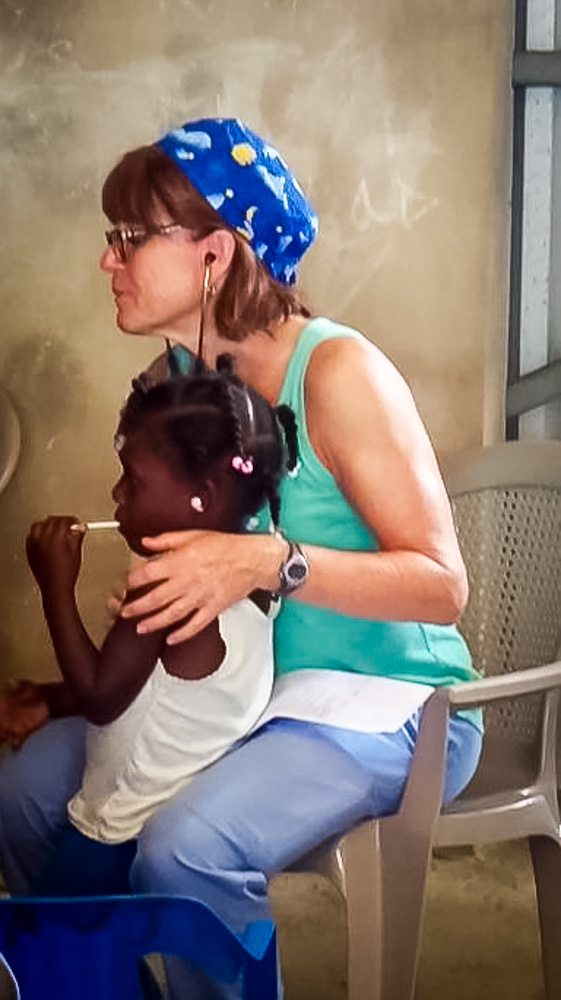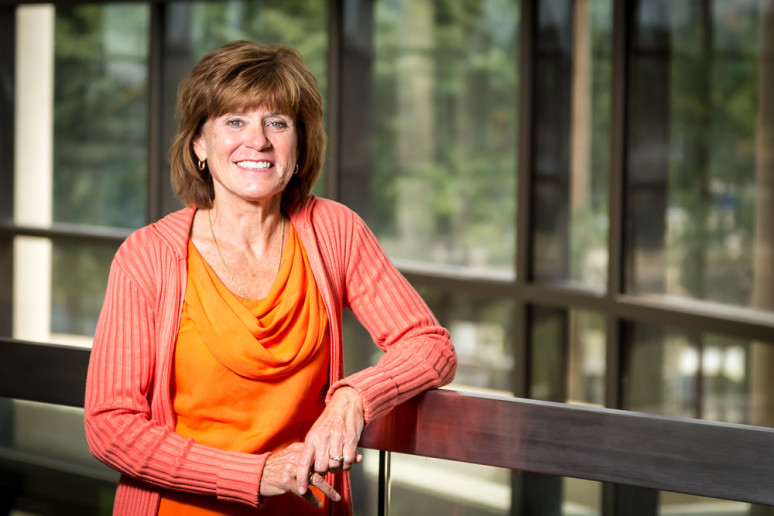 Maureen Tippen, Clinical Associate Professor in the School of Nursing, University of Michigan-Flint, holds service learning in high regard. “It just makes a person look at things differently,” she states. “We want our students to be global citizens and we really want that on their resume when they leave UM-Flint.”
Maureen Tippen, Clinical Associate Professor in the School of Nursing, University of Michigan-Flint, holds service learning in high regard. “It just makes a person look at things differently,” she states. “We want our students to be global citizens and we really want that on their resume when they leave UM-Flint.”
When Tippen began teaching at UM-Flint in 1994, the nursing program was new. In 1995, she implemented academic service learning trips, and after volunteering for a medical mission trip to the Dominican Republic, she’s returned there with a group every year since 1995. “I started taking students every year for Spring Break and we’ve gone 21 times now,” Tippen says. With the partnerships Tippen formed there, she developed a course and with University approval, started NUR 381 – International Nursing. She then volunteered in Cambodia, made connections there, and brought that country into the UM-Flint Service Learning trips, going there six times in the last ten years. “Every other year, I take students to Cambodia, and on the ‘off’ years, I usually go as a volunteer myself.” She has also taken students to Kenya, India and Peru.
For the UM-Flint students, their experience on International Nursing trips includes performing a lot of physical exams and looking for abnormalities, giving them unique, hands-on practice. “We see untreated medical issues that you would never encounter here – as sad as it is, students learn firsthand what happens when things go untreated,” Tippen says. “We see kids with crossed eyes, or with unrepaired club feet walking on their toes, and other congenital things not seen here. We have also seen malaria, typhoid, rickets and other diseases.”
But, Tippen stresses that the most life-changing thing the nursing students learn about is hope. “For many of the people living there, hope is really their livelihood,” she shares. “It’s something they carry in their hearts and when you see someone who really has nothing – but they have hope – that has been life-changing. It isn’t something that you can just get – you experience it.” This lesson, and a new gratitude, follow the students when they return home. Tippen and the students try their best to hold on to those experiences and stay grateful. “We all know how easy it is to complain about everything,” she admits.
Planning for Trips
The Service Learning trips to Cambodia and the Dominican Republic take a lot of planning. Tippen begins the process of getting the group ready in the fall semester by holding open forums. All of the interested students get to hear from program alumni and learn what it takes to participate. Since the trip is expensive ($4,024.50, includes airfare, housing, health insurance, activities, transportation and some meals), students need to begin fundraising early, or apply for UM-Flint’s scholarships. Tippen says, “the University is very generous in our global studies program because we want our students to go.” Once the group is set – usually ten students – the January semester begins the International Nursing seminar course in which they learn about the culture: the health, geography, history and how to communicate through language barriers. They also collect supplies for the trip.
Tippen says that learning about communication in different countries and cultures is of utmost importance, especially in Cambodia where they speak Khmer, a language more unfamiliar to English speakers than the Spanish spoken in the Dominican Republic. “Many of us have some skills in Spanish, so we can get by easier in a Spanish-speaking country than in one where the letters don’t even correlate to our language – so, they learn to communicate in ways other than language,” Tippen explains. It goes further than that, to include cultural communication. For example, Tippen adds, “in Cambodia, you don’t put your hand on a child’s head without permission, because it is considered sacred. I’m a pediatric nurse and I have to touch kids’ heads, so I always ask the parent before doing that.”
Each student is responsible for collecting 50 pounds of supplies, Tippen says. “Our partners in different countries let us know what they need, whether its toothbrushes, medication or specifics like casting materials.” This is another reason why the planning takes so long; the whole group works to secure the donated supplies and sponsorships by reaching out to community groups and organizations.
To secure the locations for the medical clinics, Tippen works with several NGOs (Non-Government Organizations). “They help organize the trips and make sure that we reach the people with the most need. Things change, such as weather patterns, and villages might get wiped out and the NGOs there will know where the relocated villagers are so that we can help them,” Tippen explains. “They tell us what they need and we do what we can.” One year, for example, they were asked if anyone on the Service Learning trip was certified in CPR and one of the nurses going with Tippen became certified to train CPR teachers. “On that trip, we trained just under 100 people in less than two weeks and I was so thrilled that we could do that,” she says. Tippen secured donation money in order to leave behind CPR training dolls so that the training could continue. According to Tippen, “sustainable teaching methods are really what I’m aiming for, not just coming in for two weeks with a band-aid, but sustainable things that they can continue after we leave.”
A Day in the Life of an International Nurse
Tippen explains that once she and the students are in the country, they operate like a mobile clinic. They have a base location where they sleep and then every day, they head out to a different location with supplies. “If you don’t bring the right supplies, that’s it. You’ve got nothing,” she says. “So, we have to stay really organized.” The students rotate roles daily and have two leaders in charge of organizing the group mission. Tippen gives a common example: “today, we are going to a church in a mountain village that has 200 kids. So, the group plans to bring 200 toothbrushes, soap, antibiotics, medication for lice, medication for scabies,” insisting that there is a lot of management of supplies in order to treat people in the most effective way.
Then, they get to the location and set up a clinic. “Sometimes, the space we are using doesn’t have anything, so we have to be really creative,” Tippen explains. “It’s not me going in and setting up these clinics – I let the students think it through. They are developing critical thinking skills that will apply to any job, and they look at things differently and come up with efficient solutions.” Then, they see patients all day, teaching children about hygiene and administering any necessary medication or treatment.
One Person Makes It Worthwhile
“It’s hard work and sometimes I wonder how long I can do it,” Tippen says. “But, what keeps me going are the people and the appreciation. There is always one person or something that happens that reaches me in such a way that makes it all worth it.” One of those people Tippen had the honor to revisit through her many years working in Cambodia is Sovath, whom she affectionately calls “my boy.” Their paths crossed on Tippen’s first visit there. He was a 13-year-old in an orphanage that was closing, and he had nowhere to go. So, Tippen and her team sprang into action, finding a place for him at a school. But, a few years later, that school also closed. So, again, Tippen helped find a family to take him in. Sovath had made money as a singer, so he took a chance at competing on “Cambodian Idol” – and won! Unfortunately, the “Cambodian Idol” performances didn’t pay that well, so when Sovath began medical school and broke his foot and needed surgery, he couldn’t afford the care.
Because of his “Idol” fame, the local news covered his story, and a kind man stepped up to pay for the surgery. That same man and his family developed a relationship with Sovath, and later adopted him … at 21 years old! “I went to visit him, and he picked me up in a Lexus!” Tippen exclaims. “This is the boy I had bought a bike for the year before!” She smiles, “he took me to a house like none I’d ever been in before; in Cambodia, it’s mostly small, tin houses, and even though the family lived in a palace, they were remarkably kind and humble.” Sovath, once an orphan moving from place to place and staying in tiny rooms with several people, is now stable and well cared for. He might still call her “mom,” Tippen shares, “but now, he has his own family that loves him.” She says this is a relief after all the years of worrying about him. “Now, I don’t have to worry about him anymore,” she says with a smile.
“After 39 years as a nurse,” Tippen says, “I have no regrets about my career choice. It’s a hard profession both physically and mentally, but it is rewarding. And the thing about nursing is that you don’t have to do just one thing – you can do lots of things, and I have taken full advantage of that.” Tippen plans to develop the Service Learning program at UM-Flint into a full non-profit, so that people in the community can get involved, as well. “This will allow others to have this opportunity, too,” she says. “I have alumni come back on trips with me every year, so I know that the students find it a rewarding experience.”
For more information about Education Abroad, visit goabroad.umflint.edu.
“When you see someone who really has nothing – but they have hope – that has been life-changing.”

